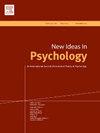Actions Speak Louder than outcomes leading to ineffective altruism
IF 2.9
3区 心理学
Q2 PSYCHOLOGY, EXPERIMENTAL
引用次数: 0
Abstract
Altruism is the intentional and voluntary act of benefiting others. However, altruists often overlook the effects and impacts of their actions, leading to suboptimal or even detrimental outcomes. This phenomenon, termed ineffective altruism, has been attributed to psychological deficits, such as motivational and cognitive impairments. In this article, we adopt a moral cognitive approach and develop an integrated model of action/outcome value decision-making from an adaptive perspective to elucidate the mechanism of ineffective altruism. our model suggests that warm-glow and reputation enhance the action value of altruism, while cognitive biases reduce the effective outcome value that benefits others. The article concludes with a discussion of how action values and outcome values relate and balance each other and analyzes how different strategies of trading off these values affect individuals and society.
行动比结果更响亮,导致无效的利他主义
利他主义是有意和自愿的行为,有利于他人。然而,利他主义者经常忽视他们行为的效果和影响,导致次优甚至有害的结果。这种现象被称为无效利他主义,被归因于心理缺陷,如动机和认知障碍。本文采用道德认知的方法,从适应性的角度构建了一个行动/结果价值决策的综合模型,以阐明无效利他主义的机制。我们的模型表明,温暖的光芒和声誉提高了利他主义的行动价值,而认知偏见降低了利他主义对他人有利的有效结果价值。文章最后讨论了行动价值观和结果价值观是如何相互关联和平衡的,并分析了权衡这些价值观的不同策略如何影响个人和社会。
本文章由计算机程序翻译,如有差异,请以英文原文为准。
求助全文
约1分钟内获得全文
求助全文
来源期刊

New Ideas in Psychology
Multiple-
CiteScore
4.80
自引率
3.80%
发文量
37
期刊介绍:
New Ideas in Psychology is a journal for theoretical psychology in its broadest sense. We are looking for new and seminal ideas, from within Psychology and from other fields that have something to bring to Psychology. We welcome presentations and criticisms of theory, of background metaphysics, and of fundamental issues of method, both empirical and conceptual. We put special emphasis on the need for informed discussion of psychological theories to be interdisciplinary. Empirical papers are accepted at New Ideas in Psychology, but only as long as they focus on conceptual issues and are theoretically creative. We are also open to comments or debate, interviews, and book reviews.
 求助内容:
求助内容: 应助结果提醒方式:
应助结果提醒方式:


